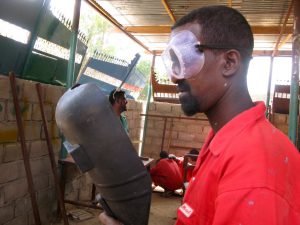Abdi Hussein was once a prisoner in Somalia with no marketable skills. Today he is covered in sawdust at Mandheeq workshop. And he has prison to thank for it
“The carpentry skills I acquired from Mandhera prison made me feel like I was admitted in a learning institution, not a prison,” Hussein said. “I am applying the lessons into making beds, dinner tables and other household items. As you can see, I am currently making a dinner table for a family who are about to wed.”
Outside the small carpentry shop located on a busy street of Hargeisa, Abdi is cutting through a log to make the newlyweds’ table. Wearing a red uniform, he reaches for a towel to wipe the sweat from his face and recalls his recent past.
When Abdi was sentenced to two years’ custody, his family had to move to Ethiopia to stay with relatives since they could no longer pay the rent. Inside the prison walls, Abdi took advantage of a vocational training course supported by the International Committee of the Red Cross (ICRC) to learn carpentry.
“I had no clue at all how it works. I used to see carpenters selling gates and beds and today here I am, because I had the chance to be among those chosen to learn something new. It was such an amazing moment in my life,” the 35-year-old said.
The ICRC has been supporting vocational training programs to help detainees acquire new job skills – carpentry, welding and tailoring — in Mandhera prison in the north of the country since 2014. In cooperation with the relevant authorities, the ICRC provides the trainers, equipment and material needed for these programs to function. Similar programs are also run in other prisons in other parts of the country to improve the well-being of detainees and facilitate their rehabilitation and social reintegration after release.
Upon release from the detention centre in March 2016, Abdi was hired by the Mandheeq carpentry shop. He was then able to bring back his family and reunite with them after two years apart.
Using the skills he honed in prison, he built his family a makeshift hut on land given to him by his uncle who was supported him after his release.
“I am happy that the $20 I make a day from my work goes towards providing education to my two daughters instead of having to worry about paying rent. I see growth in my life,” Abdi said.
Abdi said he now plans to open his own carpentry store and hire unemployed youths who otherwise might be tempted by crime.
An opportunity to rebuild their lives

Detainees enrolled in the capentry training program have a discussion with an ICRC team visiting the prison. ©ICRC/Mohamud Miraj
Jamal Hassan*, a detainee in Mandhera prison, made a beautiful dining table that impressed the prison commander, Hassan Mohamed, who pledged to buy the prisoner’s new creation. Revenue generated from the detainees’ efforts is used to cover operating costs of the program and improve the general living conditions of the detainees.
Jamal, due for release in January 2017, hopes to find money to open a workshop in Hargeisa town where detainees like him can have an opportunity to rebuild their lives once out of prison. Perhaps team up with Abdi?
Louise Broomhead, the ICRC Somalia delegate who oversees the vocational training program, says there is progress being made.
“The ICRC has provided valuable life skills in tailoring, welding and carpentry to detainees who we hope will have more options for making a living once they are released.”
She adds, “These programs keep the participants active and purposeful during the period of detention.”
This year, the ICRC has trained 180 detainees in both Bosaso and Mandhera prisons in various activities such as masonry, welding, tailoring and carpentry.
Read more about the ICRC’s work in places of detention in Somalia
Watch video on the ICRCs’ visits to places of detention
Photo gallery on how a visit to a place of detention is conducted
*Not real name



